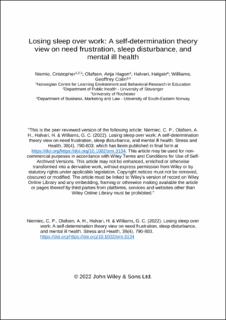| dc.contributor.author | Niemiec, Christopher P. | |
| dc.contributor.author | Olafsen, Anja Hagen | |
| dc.contributor.author | Halvari, Halgeir | |
| dc.contributor.author | Williams, Geoffrey Colin | |
| dc.date.accessioned | 2023-02-17T12:22:56Z | |
| dc.date.available | 2023-02-17T12:22:56Z | |
| dc.date.created | 2022-02-24T20:32:25Z | |
| dc.date.issued | 2022 | |
| dc.identifier.citation | Niemiec, C. P., Olafsen, A. H., Halvari, H. & Williams, G. C. (2022). Losing sleep over work: A self-determination theory view on need frustration, sleep disturbance, and mental ill health. Stress and Health, 38(4), 790-803. | en_US |
| dc.identifier.issn | 1532-3005 | |
| dc.identifier.uri | https://hdl.handle.net/11250/3051955 | |
| dc.description.abstract | Given the centrality of sleep and work in most individuals' lives, it is interesting to note that an empirical understanding of the association between what happens in the workplace and how well people sleep is in an early stage of development, at least relative to other topics that are of interest in the literature on stress and health. Using self-determination theory, the current study examined how maladaptive motivational processes at work relate to sleep disturbance and mental ill health. In line with hypotheses, the results of a cross-sectional analysis and analyses using data from two time points over 15 months revealed that employees are more likely to report sleep disturbance, anxiety, and depressive symptoms when they experience frustration of the basic psychological needs for autonomy, competence, and relatedness in the workplace. Additional results revealed an indirect effect of change in basic psychological need frustration on change in anxiety—but not on change in depressive symptoms—through change in sleep disturbance. Taken together, these findings add to the burgeoning literature on the maladaptive motivational origins of ill health and dysfunction in the workplace. | en_US |
| dc.language.iso | eng | en_US |
| dc.title | Losing sleep over work: A self‐determination theory view on need frustration, sleep disturbance, and mental ill health | en_US |
| dc.type | Peer reviewed | en_US |
| dc.type | Journal article | en_US |
| dc.description.version | acceptedVersion | en_US |
| dc.rights.holder | © 2022 John Wiley & Sons Ltd. | en_US |
| dc.source.pagenumber | 790-803 | en_US |
| dc.source.volume | 38 | en_US |
| dc.source.journal | Stress and Health | en_US |
| dc.source.issue | 4 | en_US |
| dc.identifier.doi | https://doi.org/10.1002/smi.3134 | |
| dc.identifier.cristin | 2005336 | |
| cristin.ispublished | true | |
| cristin.fulltext | postprint | |
| cristin.qualitycode | 1 | |
